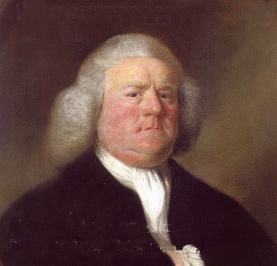William Boyce facts for kids
William Boyce was an important English composer who lived in the 18th century. He was born in London on September 11, 1711, and passed away in Kensington on February 7, 1779. Boyce wrote music during a time when music styles were changing. He lived at the end of the Baroque period and the start of the Classical Period. He is well-known for his music written for churches, plays, and orchestras.
Contents
William Boyce's Life Story
Boyce's Early Years
William Boyce was born in the City of London. His father worked as a cabinetmaker, building furniture.
Boyce started his musical journey as a choirboy at St Paul's Cathedral. After his voice changed, he continued his music studies with a teacher named Maurice Greene.
Once he finished his studies, Boyce got his first job as an organist. He played the organ at the Earl of Oxford’s chapel in Cavendish Square. Two years later, he moved to another organist job at St Michael’s Cornhill. He kept learning music, and his new teacher was Pepusch.
Becoming a Famous Composer
Boyce wrote many songs for Vauxhall Gardens, a popular place where people went for entertainment. Lots of people would have heard his music there. In 1736, he became the composer for the Chapel Royal. This was a very special honor.
During the 1740s, he wrote a theatre show called The Secular Masque. The words for this show were written by John Dryden. In 1749, he earned the title of Doctor of Music. He received this after his anthem O be joyful was performed.
Challenges and Royal Music
By this time, Boyce was very famous. He moved into a large house in Chancery Lane. He also got married and started a family. He was asked to write music for the theatre in Drury Lane. This was a big deal, as he hadn't written much theatre music before.
It might have been difficult for him to work with orchestras because he was starting to lose his hearing. This made rehearsals tricky. Boyce wrote a lot of music for the theatre. Some people thought he was in a competition with another composer, Thomas Arne. However, it was probably their fans who encouraged this idea, not the composers themselves.
In 1755, when Maurice Greene passed away, William Boyce took his place. He became the Master of the King's Music. This meant he had to write special songs, called odes, for every New Year and for the King’s birthday. He continued to do this for the rest of his life.
Later Life and Legacy
Not many of Boyce’s works were printed and sold while he was alive. He wrote eight symphonies. His earlier symphonies sounded like Baroque music. Later, his style began to change towards the Classical style. But as he became very deaf, he couldn't hear the new music being written by others. This meant his own style stopped changing.
He spent a lot of his time putting together a collection of church music. This collection was called Cathedral Music. It included music from two centuries of English church music. He featured works by composers like John Blow, Henry Purcell, Pelham Humfrey, and Orlando Gibbons. He also encouraged singers to use a full music score. This allowed them to see how their part fit with everyone else's. Today, this is normal, but it was a new idea back then.
William Boyce's Music
Boyce is best known for his eight symphonies, his anthems, and his odes. He also wrote a masque called Peleus and Thetis. He composed songs for John Dryden's Secular Masque.
He also wrote music for plays by William Shakespeare. These included The Tempest, Cymbeline, Romeo and Juliet, and The Winter's Tale. He created a lot of chamber music, too. This included a set of twelve trio sonatas. He even composed the British and Canadian Naval March, "Heart of Oak." The words for this song were added later by David Garrick. Boyce's music is always very well-written, especially his fugues and dances.
After he died, people mostly forgot about Boyce. In the 19th century, he was mainly known for editing Cathedral Music. Today, some of his orchestral and instrumental pieces are often played and enjoyed.
 | William Lucy |
 | Charles Hayes |
 | Cleveland Robinson |


